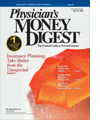Fund Your Medical Expenses with HSAs
There are now three certainties weface in our lives, death, taxes, andrunaway medical insurance premiums,and many employers considerthat they are losing the struggle with therising costs of premiums.
One outgrowth of runaway premiumsis the emergence of health savingsaccounts (HSA). An HSA is first and foremostan individual trust account for thepurpose of funding allowable medicalexpenses. The intent is to allow participantsto save for prescription and othermedical costs upon their retirement. Eitherthe employee or the employer may maketax-deductible contributions to the HSA.
Mutual Benefits
The HSA regulates the type of medicalplan that can be attached to a savingsaccount. The medical plan must be a high-deductiblehealth plan (HDHP). The minimaldeductible is $1000 and the total outof-pocket expense may not exceed $5000for the individual ($2000/$10,000 for families).The medical plan designs are notallowed to cover doctor visits or prescriptioncosts with copays. Instead, theemployee would apply those total coststoward the deductible and be reimbursedfor those costs from the savings account.
Employers will benefit from HSAsbecause they will save premium costswith the HDHP and reduce their liability.Employees will benefit from HSAs for thefollowing reasons:
- There is no "use it or lose it"provisionin the HSA. Unused HSA dollars remain inthe plan until used by the employee.
- The HSA is portable.
- Employees will retain control oftheir own account.
- The employee may be able to save formedical expenses in the future.
HSA Concerns
A downside of the HSA is that theemployees will not have the moneyavailable when they need it for medicalexpenses. This can occur for a number ofreasons. Contributions to the savingsaccount may not exceed 100% of thestated deductible or $2600 for individuals($5150 for families). Most of the plandesigns have a high deductible plus acoinsurance component. The employee isnot able to accumulate enough moneyto cover the full risk.
The employee could face a cash flowproblem if they do not have the necessaryfunds in their account at the timeof a medical event. Employees canspend their money on IRS allowablemedical expenses such as eyeglasses,dental work, and over-the-counter medicine.Although these expenses areallowable for the savings account, theywill not count toward the deductible ofmost medical plans. The employee maynot have funds for the medical deductiblewhen needed. Cash-strappedemployees simply may not be able tofund their savings account. They mayexpect the employer to provide thatfunding or go unprotected.
HSA plans may not be perfect foreveryone, but due to the runaway premiumsand government legislation, itappears that the HSA model will be thenext generation of medical benefits thatwe will be using.
is the
director of employee benefit services
at Tycor Benefit Administrators,
Inc. He develops customized
employee benefit programs
by analyzing the benefit
needs of clients, consulting on possible solutions,
and helping to implement changes. He
welcomes questions or comments at 800-695-9932, or visit www.tycorbenefit.com.
Scott A. Crane, CLTC,
